Media | Articles
The Kei Kerfuffle: States Struggle Over What To Do With These Tiny Trucklets
Yes, the sales of little Japanese Kei trucks (it’s pronounced “kay”) were up in 2023, one reason they have been getting a lot of attention from the media. The compact haulers, built to conform with Japan’s keijidōsha class of light vehicles, are practical as well as cheap and charming, so smitten American buyers have been importing them from their home markets at a higher rate. But we should keep things in perspective: According to the Japanese Used Motor Vehicle statistics, 7594 Kei trucks were imported into the U.S. last year. Ten years ago, before many of these Japanese market vehicles met the 25-year age limit to legally import into the U.S., that number was 797.
Meanwhile, Ford sold 750,789 new F-150s in 2023. Those who suggest that the backlash from state governments seeking to keep Kei trucks off the road is even partly motivated by the desire of manufacturers of full-sized pickups to keep the market for themselves, a view that has also been represented in the media, are probably incorrect.
Governments keeping them off the road is the other reason the tiny, right-hand-drive Kei trucks have been in the news, and we blame Rhode Island. While the federal government writes the rules controlling the importation of foreign market vehicles like Kei trucks, it’s up to individual states whether or not you can register and drive them on the road. According to multiple sources, Kei trucks are street-legal in 19 states. But in Rhode Island there are only 30 or so Kei trucks on the road so, as they’ve done in many places, Kei trucks have sort of driven under the radar when it came to the law.
Until this happened, as told last month by the Providence Journal: “Imagine this: You import a mini-truck from Japan after calling the Rhode Island Division of Motor Vehicles and being assured that you’ll be able to register it here. Several years later, you receive a notice from the DMV: The Japanese mini-truck’s registration has been revoked, and you’ll need to hand over the license plates.”
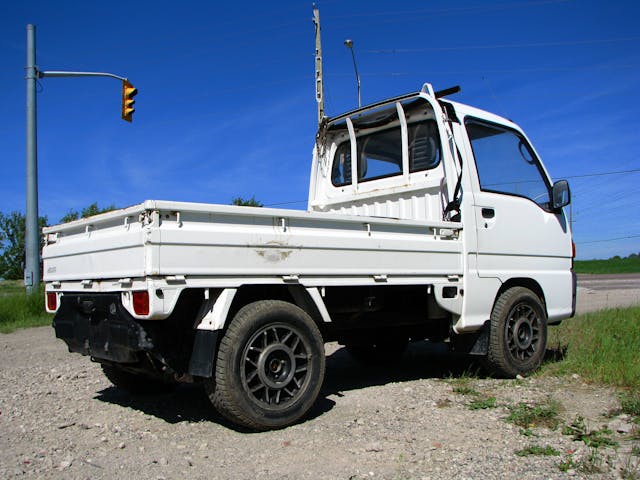
One of those owners was a constituent of State Senator Louis DiPalma, who began asking questions. Apparently, the state DMV had, since 2021, been re-evaluating its decision to issue registrations for Kei trucks based on existing law, and recently started demanding that owners return their license plates.
Marketplace
Buy and sell classics with confidence
Publicity ensued, and the story was picked up by a raft of media sources, and officials in other states began asking questions about what their DMVs were doing about the danger represented by allowing Kei-sized vehicles on the road. Citizens began picking sides, and the next thing you know, outlets like NBC News and The Economist are reporting on the Kei kerfuffle.
And the whole mess is confusing. In Wyoming, you can drive your Kei truck on any road but an interstate highway. In Georgia, the Motor Vehicle Department conclusively insists that Kei vehicles “are not ‘street legal.’ Kei vehicles are barred from titling and registration.” That said, “…both customers and county tag offices have been confused by the title and registration laws relating to these vehicles. Due to this confusion, certain customers have successfully, albeit unlawfully, had their Kei vehicles titled and registered in Georgia.” Gee, whose fault is that?
Angry Kei truck owners have pointed out that motorcycles and scooters are allowed on public roads, as are hundred-year-old, 20-horsepower Ford Model Ts: Are they any safer than a Kei truck? In some states, the battle over Kei rights is getting downright contentious. Kei truck owners are banding together to advocate for fair treatment; the Texas Kei Vehicle Advocates, for example, report that they’ve already been successful in getting the state to reverse its ban on titling Kei trucks. A memo issued April 4 by the Texas Department of Motor Vehicles said, “The department has revised the titling and registration requirements for these vehicles. Effective immediately, mini vehicles are required to be titled and must be registered if operated on public roadways.”
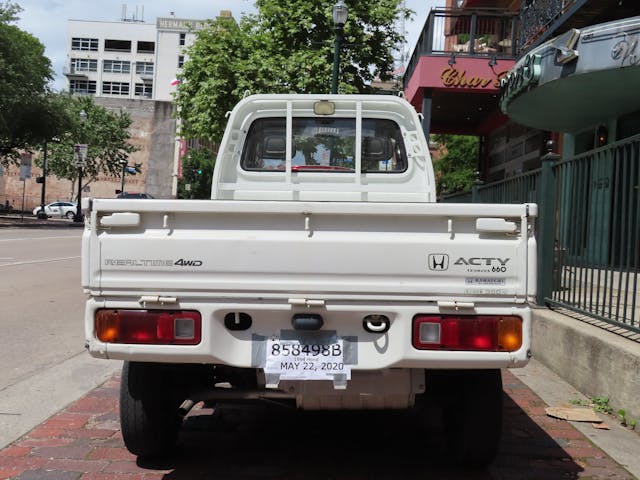
This cultish American enthusiasm for Kei trucks likely calls for an explanation. While we are talking about the tiny, single-cabover pickups or microvans that you’ve likely seen, say, doing maintenance on a golf course, “Kei” refers to more than that.
Kei is short for kei jidōsha, which is Japanese for “light motor vehicle.” A vehicle that is considered a Kei—and this has changed over the years, dating back to 1949—is, since late 1998, the following: Has an engine no larger than 660cc (about 40 cubic inches); no more than 63 horsepower; is no longer than 3.4 meters (just over 11 feet), and no wider than 1.48 meters (just under five feet). By comparison, the 2024 Nissan Versa, one of the few remaining small cars sold here, is 14.7 feet long and has 122 horsepower.

Since—obviously—the tiny Kei is not built to the U.S. Federal Motor Vehicle Safety Standards, only Kei vehicles that are older than 25 years can be imported into the U.S., because vehicles that elderly aren’t subject to FMVSS. That’s why the newest Kei vehicles you see for sale in America are typically 1999 models.
There are also Kei cars, including some sporty ones like the Honda Beat and Suzuki Cappuccino convertibles, and the Autozam AZ-1, built by Mazda and featuring gullwing doors: Those three are especially appreciated by American collectors, and quite a few have been imported. Decent Beats and Cappuccinos start at under $7000, while the rare Autozam AZ-1 starts at about $12,000, and can climb to over $30,000.
But it’s the Kei truck that is pulling in the (relatively) big numbers, and there are many companies in America that want to sell you one. Among them is Japan Car FL, based in Oldsmar, Florida, just south of Tampa. They have been importing JDM (Japanese Domestic Market) vehicles since 2018. The small, family-owned company advertises that they are licensed, bonded and insured, which is important in the JDM world, because not every company is.


Among Japan Car FL’s Kei vehicles is a 1999 Honda Acty Kei truck with four-wheel-drive, air conditioning and custom wheels for $10,850, and an air-conditioned 1999 Subaru Sambar Classic Kei microvan for $12,250. Each, says Japan Car FL, “comes with a clean Florida title, and is ready to be driven home on the day of purchase.”
While Japan Car FL handles all types of JDM imports, the business is driven by Kei trucks and microvans, said owner Lana Kashchuk. “There has been an increase in queries as they become more and more popular. It’s the top seller.”
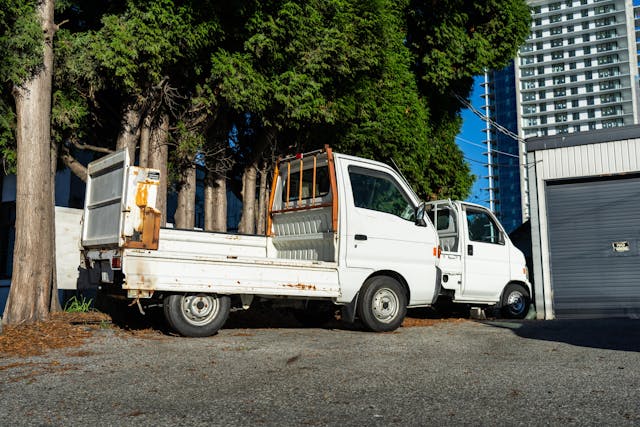
Buyers vary. Some customers use them for work—Kei trucks are affordable, maneuverable, and their small engines are easy on gas. Many have six-foot beds that rival bigger trucks in cubic-foot capacity. “We have a lot of small business owners who buy them for tree-trimming, pool service, that sort of thing. But we also have customers who use them instead of golf carts locally to take them shopping or to Home Depot, or they drive them on weekends to go to the beach,” Kashchuk said.
There’s no problem in Florida—for now, anyway—to get them registered and tagged. The state now officially refers to them “mini trucks,” for use on roads where the speed limit is 35 mph or less. “But at the same time they are not branded as ‘low-speed vehicles’—they are not golf carts, so they get a regular tag and a regular title,” she said. “We have a lot of customers who aren’t having any problems or issues because they have a license plate like any other car, and they have a title like any other car, but it says ‘MT’—mini truck.”
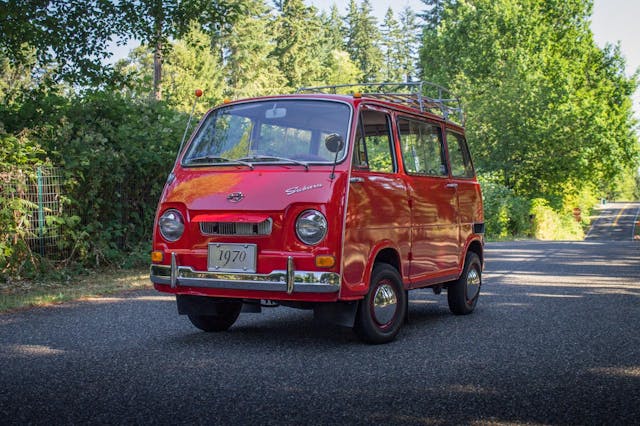
Modern Kei trucks and microvans have no problem keeping up with the normal flow of traffic—that 1999 Subaru Sambar Classic, for instance, has 54 horsepower, and is good for 70 mph. Yes, they may technically be limited to roads where the speed limit is just 35 mph, but many traffic officers will look the other way as long as a Kei isn’t holding up the show.
As in most states, you can’t register a vehicle in Florida without proof of insurance. You can insure Kei trucks, but you may have to shop around for an agent familiar with the category, Kashchuk said. “It all depends on the agent. He or she might be confused about the shorter VIN number—because it isn’t the usual 17 digits and letters like a typical U.S. car, and because they may have a model name that is not familiar to them, not in their system.” As far as financing, Japan Car FL works with several companies that make loans on Kei trucks.
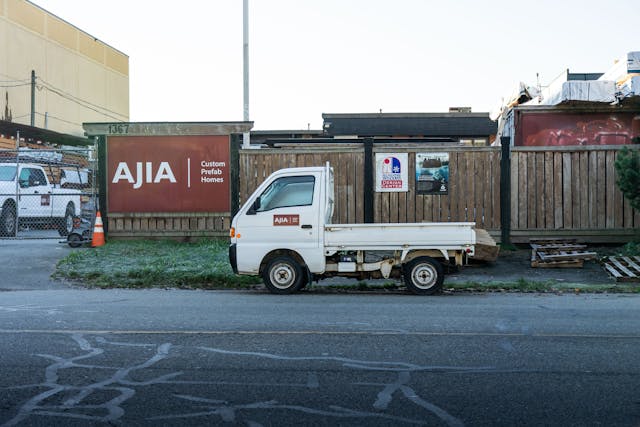
Even as states struggle to decide exactly what a Kei truck should—or should not—be allowed to do, there will likely still be a market for them, if for no other reason than because they are reasonably affordable. And cute.
Oh, and what’s happening in Rhode Island, where this confusion arguably began? Senator DiPalma is co-sponsoring legislation that would restore the ability of Kei truck owners to register their vehicles, and get license plates. That’s the good news. The bad news for Kei lovers: The new law would only apply to the 30-odd Kei trucks that are already on the road there, for use “until they can’t function anymore,” DiPalma said. There is no provision for adding any new Kei trucks to Rhode Island roads.
***
Check out the Hagerty Media homepage so you don’t miss a single story, or better yet, bookmark it. To get our best stories delivered right to your inbox, subscribe to our newsletters.
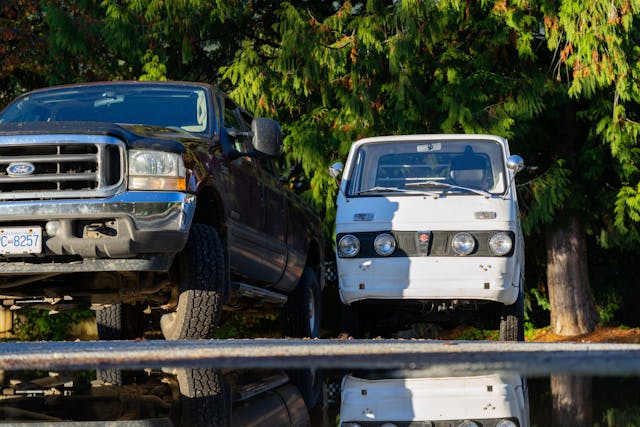










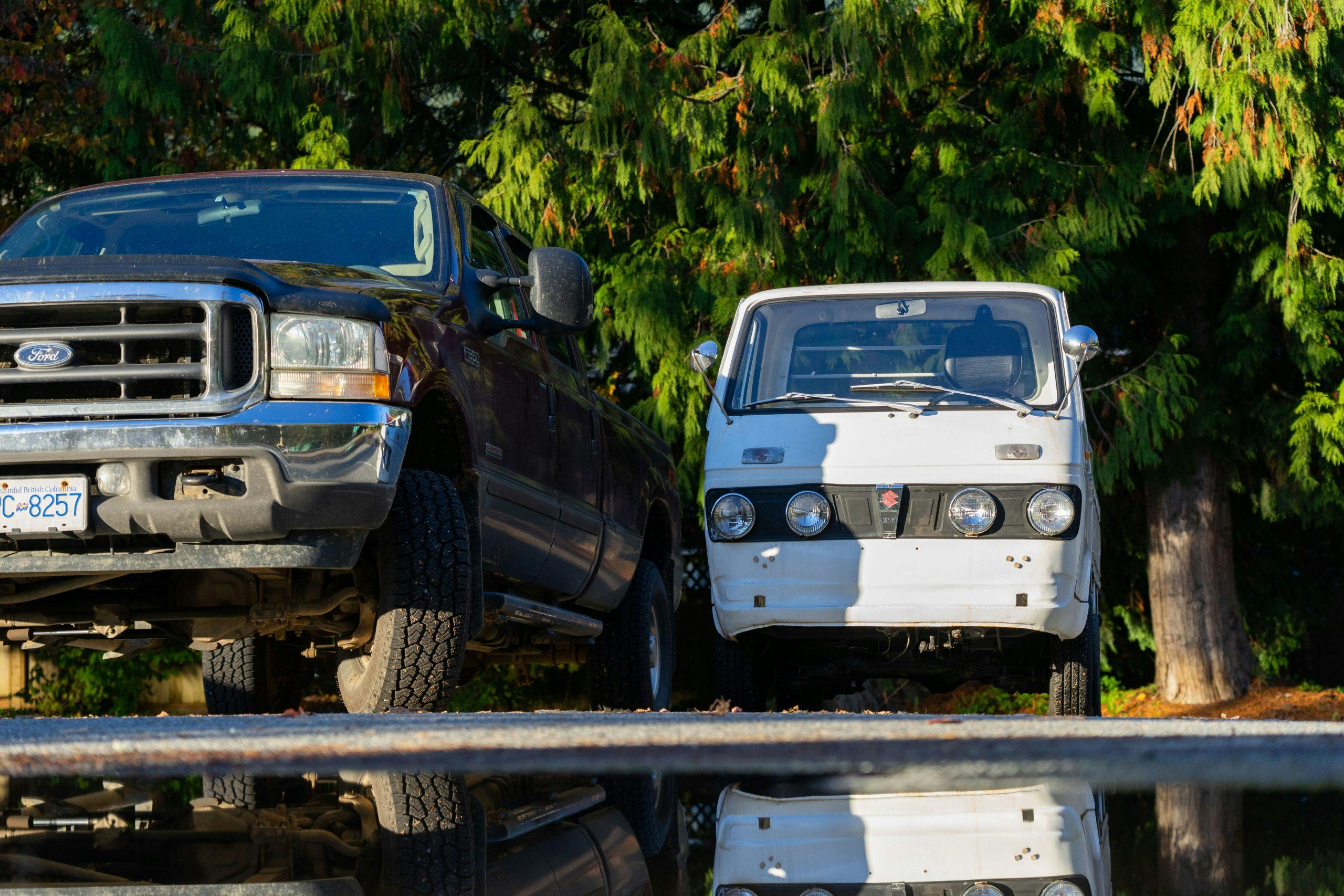
The motorcycle/scooter argument is misdirection. It’s STRONGLY recommended that you put on full gear to protect yourself in a two wheeled vehicle crash. I tell people when I start gearing up to ride that I’m “putting on a car”. Are you putting on a helmet to drive a kei? You should be, based on US crash standards.
I saw one of these 4wd pickups in a local parking lot. It had plates and an inspection sticker. Apparently they are road legal in New Jersey.
I don’t understand why it’s OK to register and drive say, a Model T, a 2CV, an early MG, or WWII era Jeep on the roads but these (25 year old) trucks are not. There are thousands of collector vehicles that don’t meet modern safety standards or can’t maintain Interstate Highway speeds yet are driven every day. Most Hot Rods don’t meet safety standards as well (yes, some are very well engineered and built, many are not). How is an old Morgan 3 wheeler, a “T “ Bucket rod, or even a Stutz Bearcat any safer for its occupants than a mini truck? Using that logic, your state DMV could ban most of the cars we read about on this site. If I want to drive down the street in a car W/O modern safety devices, be it a 250 GTO an old Austin 7, that’s pretty much on me and anyone who chooses to get into the vehicle, we don’t pose a threat to the public. A Plumber driving down my street in a mini truck is a danger, but an 18 year old in an 800 HP three ton pickup isn’t? Sorry, not buying the argument to ban these vehicles.
Please don’t give them more ideas.
If everyone’s so concerned that these little vehicles are unsafe, while 1950s microcars and Model Ts (and other “unsafe” cars from the 1890s to some arbitrary recent year) are somehow OK, why not just require a different license plate for any car built before, say, 25 years ago? The total number of vehicles on the road that fit that description is likely a tiny percentage anyway, but it could provide an extra revenue stream for state DMVs (to say nothing of insurers). The added interest in cars on the road would be well worth it, I’d say. (I owned a 1960 Goggomobil TS400 for about 10 years in Massachusetts, and lived to tell the tale. I knew better than to take it on a major road when I didn’t have to. The sheer fun was worth the occasional terror.)
OK, peeps! I’m seeing a market opportunity here. Modest size pickup truck, single cab, four or six cylinder engine, six foot bed (minimum), stick shift, ladder frame so the bed could be swapped for a box body or perhaps even a camper shell, possible 4WD option. Choices – transverse engine w/front wheel drive would keep the bed low and easier to load but make 4WD impractical. Longitudinal engine/RWD makes 4WD easier, but raises the floor because of the drive shaft. Keep it simple – wind-up windows, minimal “driver aids”, need heat, A/C, radio. Don’t need GPS, augmented stability, lane keeping, self driving, could use cruise control (option). Target price $15K good luck, however:
Here’s a possible way to keep this under budget – remember the fiberglass MG-TD replicas? They started with a VW, took off the Beetle body, used a bunch of VW parts, and were titled as a VW. Suppose someone made a kit to use some existing, common, inexpensive car as the “base” or donor, and the kit was a small truck body? That avoids registration problems, crash testing, the donor car already has jumped through all those hoops, we’re just changing the body to something more useful.
Crowdfunding project maybe? C’mon, we’re supposed to be the gear-heads here, lets take on this challenge!
Recently, it came to my attention that kei trucks are illegal to plate for road use here in Minnesota. When this information landed, I was initially taken aback. How could they outlaw these cute little things? They don’t harm anyone, and other than during rush hour in the immediate Twin Cities, traffic is generally pretty light. At least they could be used on suburban and rural roads without any real danger.
Then I spent ten days in Hawai’i, where kei trucks are absolutely everywhere and used for everything. And, man, they are small. Toward the end of our trip I saw a Honda Acty van on O’ahu’s H1, a major and busy highway, late on a clear but fairly breezy evening. Dude was buzzing along at probably 50 mph in the far-right lane. I passed him at 70.
In that moment I realized kei trucks are probably a bad idea here in the Bold North. Why? Imagine being on I-90 through the plains of southern Minnesota in the dead of winter. In the snow. With a strong crosswind. And then in the limited visibility a snow plow comes along and punts you into next week. The driver assumes he hit a frozen expansion joint and keeps right on truckin’.
Imagine a motorcycle, dead of winter on the same road and a snow plow punts him never even knowing he hot something. Motorcyclists fault for the wrong vehicle for the condition is what you may say, so what is different with the vehicle you gave as an example? As far as passing someone buzzing along at 10mph under the speed limit and you passing them at a law breaking 10mph over the speed limit, it happens. Sometimes people do actually go UNDER the speed LIMIT. (last I checked, limit was synonymous with maximum)
I live in PA & drive mine on I70 @ 68 MPH with no problem. In the instance of bad weather you are wright to a point. The van gets pushed by cross winds, the truck not so much. What you are driving, drive accordingly to the weather. Its the same as me driving my 84 3/4 ton Suburban at 70mph when traffic is doing 45mph in 6″ of snow. Just cause the Burb can. Caught massive snow storm from Baltimore to Pitt last winter in my Spark. 30mph all the way. Just drive in your vehickles capabilities
Odd all the haters. These things are cool and there are many varieties, little cars, vans, trucks, firetrucks, sporty cars, what’s not to like.
So does Hagerty insure Kei vehicles? (I need to get one insured and haven’t called yet) As far as not safe, I see everyone talking about how they are such a bada$$ but still scared to drive one. I’ve driven smarts since they were introduced in the US almost two decades and my favorite was a crusty old guy on a Harley who talked about how a smart was unsafe. I offered up a game of chicken on the spot and he said “touche'”. He suddenly got my point. As with anything, they serve a purpose. Except squatted trucks, those are just dumb. 😀 (I own a couple dozen vehicles that fit almost all categories and Hagerty is my insurance company for my antiques).
Hagerty insures, both mine thru them at $10G’s each. $250 for the both a year
Hagerty refused to insure mine because I was honest about how I would use it. I live in a rural area and would use it for chores around my property. They said that was farm use and they wouldn’t insure me. They would if I had said it was a collectors vehicle that I only take to car shows. I suspect it’s different depending on how your application is viewed. I should have lied because insurance elsewhere is massively more expensive.
I normally despise the “Montana LLC” solution used by (mostly) wealthy car owners to short-change their own state’s coffers, but in a case like this where there’s no fighting stupid, I think that’s the course I’d pursue.
And in my opinion, the whole safety argument is a smoke screen. So many examples of equally egregious vehicles have been listed in the comments to make that observation obvious. No, follow the money – or those afraid of losing the money – and you’ll discover what’s driving the anti-Kei sentiment.
And yet, side by side vehicles are now being allowed on most roadways in most states requiring certain modifications / upgrades to be street legal, ouside of having a certain engine size. The Kei trucks and vans, even though are not made to U.S. safety standards, would protect the occupants more due to the fully enclosed factory built cab, standard seatbelts, all street legal lighting, license plate bracket, and working horn. So what if it takes longer goind down back roads and other side roads doing 55 mph without going on the interstates and other limited access roads. A lot of older cars from the Henry ford’s days didnt have seat belts installed when those older vehicles were originally being produced. I would also bet anything that most automobile manufacturers in the U.S. didn’t put them into their vehicles until it was mandated until 1968 by the U.S. Government.
If all else fails, treat it like a motorcycle and require the person to have a trike license to be able to operate it on the road. Or a motorcycle license because on a trike or motorcycle, you are the crumple zone.